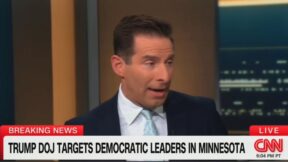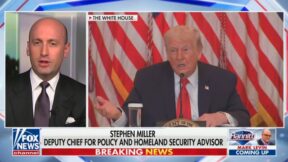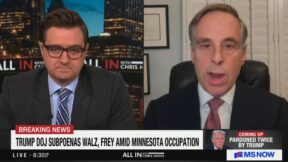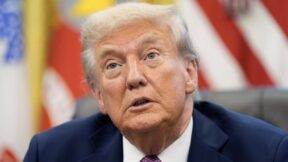Fed Chair Jerome Powell Quotes Ferris Bueller to Warn Trump Tariffs Will Fuel Inflation And Slow Down Growth
Federal Reserve Chair Jerome Powell delivered remarks at the Economic Club of Chicago Wednesday on a variety of topics, including warning that President Donald Trump’s proposed tariffs were unprecedented, even bigger than the Smoot-Hawley Tariff Act.
Earlier this month, Trump held a press conference in the Rose Garden to sign an executive order imposing sweeping new tariffs on virtually all imports. Multiple Republicans and some of the president’s staunchest defenders on Fox News have spoken out to criticize the tariffs as causing unnecessary economic harm.
Last week, the president wrote a Truth Social post to announce there would be “a 90 day PAUSE” for the increased tariffs on 75 countries that he said had reached out to the U.S. to negotiate, along with raising the tariff on China to 125% because of the “lack of respect that China has shown to the World’s Markets.”
It’s been a roller coaster ride for markets, investors, and both U.S. and foreign businesses, as the list of countries — and aquatic flightless birds — subject to the tariffs has changed on a seemingly daily basis, along with the rates and exemptions and other details, and government officials have scrambled to make the necessary adjustments.
The Smoot-Hawley Tariff Act, signed into law in 1930 by President Herbert Hoover, is widely viewed by historians and economists as exacerbating the Great Depression, including a famous scene from the 1986 film Ferris Bueller’s Day Off, in which former presidential speechwriter turned actor Ben Stein lectures a class of drowsy, distracted high schoolers about the damage wrought by those tariffs 95 years ago.
Powell himself invoked the movie in his introductory remarks as he discussed how the Fed was working to achieve its goals of “maximum employment and stable prices.”
“As that great Chicagoan Ferris Bueller once noted,” said Powell, “life moves pretty fast. For the time being, we are well-positioned to wait for greater clarity for considering adjustments to our policy stance. We continue to analyze incoming data, involving outlook and balance of risks. We understand elevated unemployment and inflation can be damaging and painful for communities, families, and businesses. We will continue to do everything we can to achieve our maximum stability and pricing goals. Thank you, and I look forward to our discussion.”
He settled into a chair for a Q&A led by moderator Raghuram Rajan, a finance professor at the University of Chicago, who asked him about the status of the president’s tariffs (relevant section starts around 23:30 mark).
RAJAN: I want to pick up on a word often used today, uncertainty. As the respondent to a Dallas Fed survey said, “I have never felt more uncertainty about my business in my entire 40 plus year career.” It is not just about immediate policy uncertainty, but entire change in the U.S.’s economic philosophy, structural uncertainty.
One of the effects as you pointed out, firms postpone investment. Even after the tariffs stabilize, firms that contemplate re-shoring production facilities will hesitate, not knowing if tariffs will be reversed in the future, may be the next administration. How do you take longer-term insecurity into account in your policies?
POWELL: Let me just agree. What comes back very strongly, and everyone will understand this, these are fundamental changes in long-held policies in the U.S. There is not any real experience. Previous tariffs were not that strong and they were 95 years ago [Smoot-Hawley].
Businesses and households are saying in surveys they were experiencing incredibly high uncertainty. There was a lot of research, some from the Fed, showing that does lead to businesses and households stepping back from decisions, which makes common sense. You hope that is something, you go through a phase and things become more certain, and therefore, people can resume normal economic activities given their understanding of what is normal.
Your question is if uncertainty remains high. I think that is a difficult environment. People’s expected rates of return would be higher. That would weigh on investment in general. If the U.S. were to become a jurisdiction where risks are structurally higher going forward, that would make us less attractive. We don’t know that, but i think that would be the effect.
Watch the video above via C-SPAN.





Comments
↓ Scroll down for comments ↓